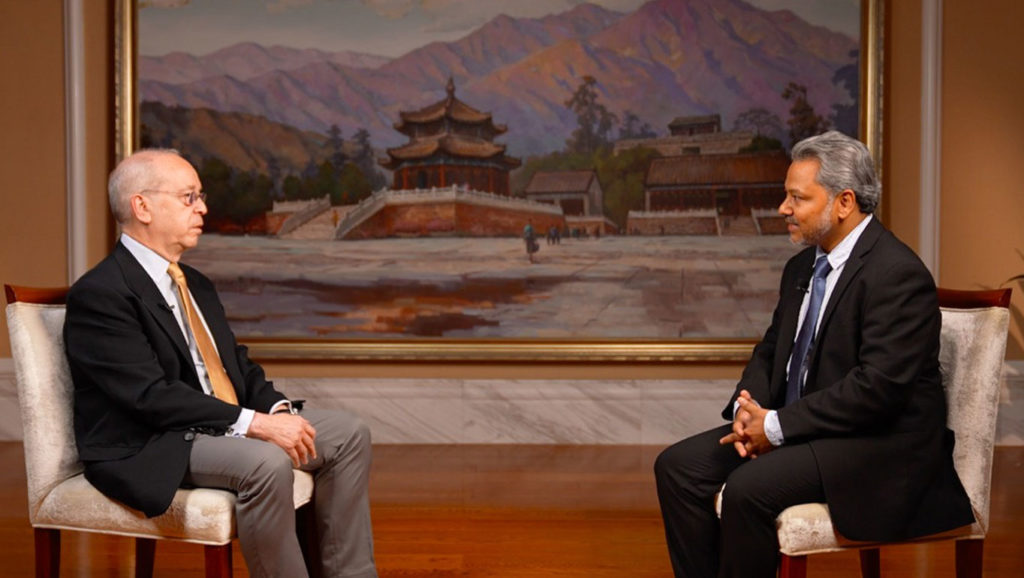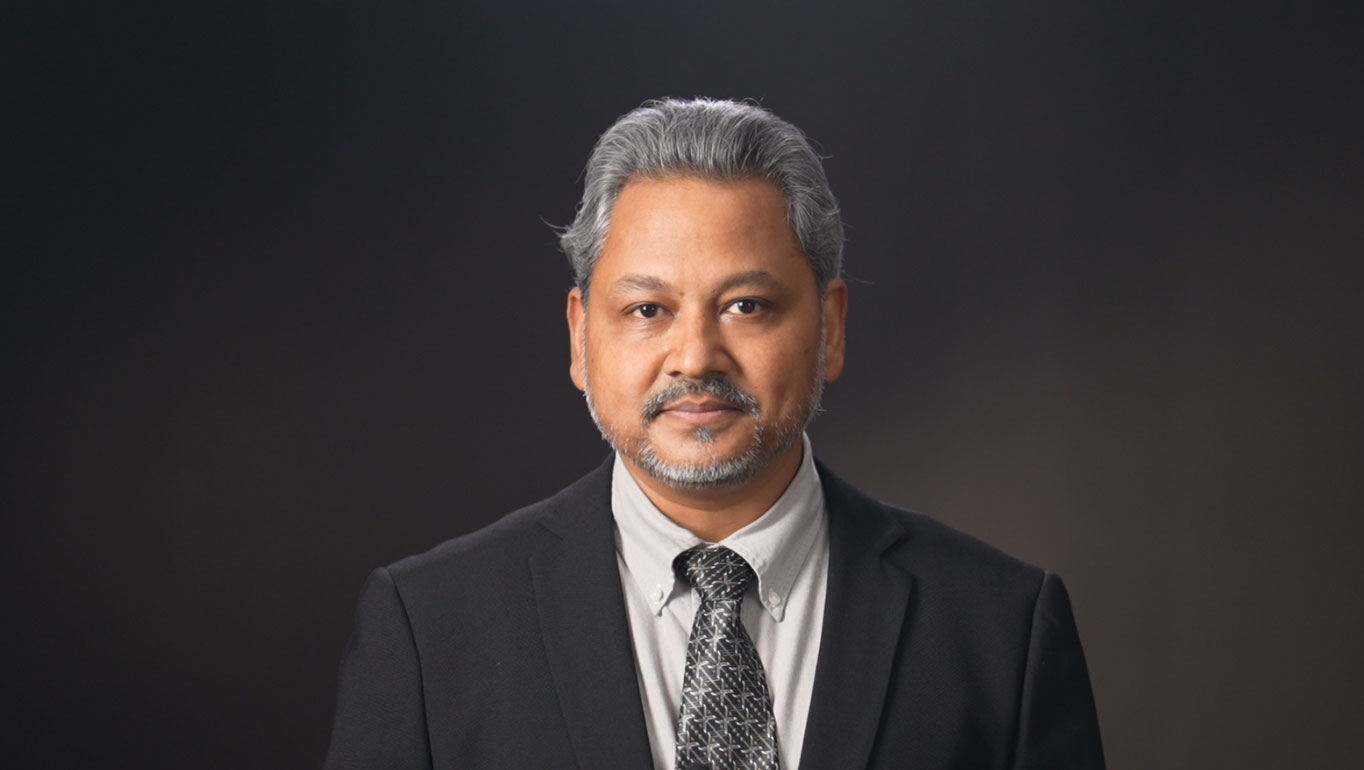This article forms a part of a series of interviews with people in the media to provide news and views that shape our perceptions of world affairs. Abhishek G. Bhaya spoke to UN Today about his life and professional career in television.
What is your professional background?
I embarked on my journey as a journalist at a relatively young age, as I realized that my insatiable curiosity and diverse interests in astrophysics, politics, international relations, history and culture could be satisfied only by a career in the field of media. It was evident to me that a career in journalism was the most fitting path to explore my passions, tell compelling stories, and harness the transformative power of journalism to enlighten, educate, and catalyze societal change.
With a career spanning over 25 years, I’ve traversed the diverse landscapes of print, broadcast, and digital media. My professional odyssey commenced in 1998 when I took on the role of a reporter at The Times of India. Since then, I’ve had the privilege of contributing my skills and expertise to a multitude of esteemed media organizations in different parts of the world, including positions at Channel 7 (India), Gulf News and Khaleej Times (UAE), and Muscat Daily (Oman).
At present, I hold the role of Senior International Editor at CGTN (Commentary & Opinion) based in Beijing. In this capacity, my responsibilities extend to writing insightful analytical reports and conducting on-air video interviews with global experts, exploring the intricate dynamics of geopolitics and international affairs. This role allows me to continually delve into the ever-evolving narratives that shape our world, utilizing my journalistic acumen to foster meaningful discourse and deeper understanding among our audience.
What’s the best interview you’ve ever done?
Throughout my career, I’ve had the privilege of conducting a multitude of interviews with esteemed individuals from various fields, including top diplomats, ministers, Nobel laureates, renowned international scientists, corporate leaders, and global experts. With the wealth of interviews I’ve conducted over the years, it becomes a challenge to single out just one as the “best.” However, there is a series of interviews that I hold in particularly high regard.
Between 2002 and 2003, I had the opportunity to conduct a series of interviews with prominent scientists for The Times of India’s Opinion page. The list of interviewees included illustrious names such as Rolf Martin Zinkernagel (Nobel Prize for Medicine, 1996), Ahmed H. Zewail (Nobel Prize for Chemistry, 1999), Roger Penrose (Nobel Prize for Physics, 2020), Craig Venter (known for pioneering work in human genome sequencing), Mark E. Welland (a leading nanotechnology scientist), Kevin Warwick (known as the world’s first cyborg for his pioneering work in cybernetics), Y. S. Rajan (a prominent Indian space scientist), and many others.
What made this interview series exceptional was its comprehensive exploration of scientific and technological advancements and their profound impact on the trajectory of humanity. The conversations with these brilliant minds delved not only into the realm of science but also touched upon the philosophical, ethical, and spiritual dimensions of human existence in the context of the universe. This multifaceted approach resonated deeply with our audience, and we received overwhelmingly positive feedback.
These interviews hold a special place in my heart, particularly because they occurred early in my career and played a pivotal role in establishing my reputation as a journalist with a passion for science. As a young and curious journalist, I also had the privilege of reporting on Stephen Hawking’s visit to India in 2001, further fuelling my enthusiasm for exploring the frontiers of human knowledge and sharing those discoveries with the world.

Abhishek G. Bhaya interviewing Daniel Russel, former U.S. Assistant Secretary of State for East Asian and Pacific Affairs.
What is the interview you’d like to do but haven’t been able to yet and why?
One interview that has been a long-standing aspiration for me is to have a conversation with the renowned American linguist, philosopher, and political activist, Noam Chomsky. There are several compelling reasons why this interview has been on my wish list.
Noam Chomsky’s work spans multiple disciplines, from groundbreaking contributions to linguistics to his thought-provoking insights on politics, media, and the role of intellectuals in society. He has had a profound influence on both academia and the global discourse on critical issues.
Exploring the depths of Chomsky’s extensive commentary on politics and society would be a fascinating intellectual journey. His critique of U.S. foreign policy, corporate influence, and media manipulation have resonated with many, including myself. Engaging in a conversation with him would provide an opportunity to delve into these critical topics and gain insights into his perspectives on contemporary global affairs.
Furthermore, Chomsky’s ability to synthesize complex ideas and communicate them effectively to a wide audience is admirable. Learning from his experience in conveying complex concepts in a comprehensible manner would be invaluable for me as a journalist.
In essence, an interview with Noam Chomsky would not only be an intellectually stimulating experience but also an opportunity to gain a deeper understanding of language, politics, and the interplay between the two. His wisdom and perspective would undoubtedly contribute to informed and thought-provoking discussions, which is why this interview remains a professional aspiration of mine.
What is your view on the role of media?
The role of media is multifaceted and vital in our society. It serves as a watchdog, holding institutions and individuals accountable for their actions. Media also plays a crucial role in informing the public, shaping public opinion, and fostering a sense of community by providing a platform for diverse voices and perspectives. Ultimately, it is the fourth estate that helps ensure transparency, democracy, and the free exchange of ideas.
However, this role is ever-evolving and has dramatically evolved over the decades with the emergence of new communication technology and digital/social media. Today, the media is like a double-edged sword, with both positive and concerning aspects. On one hand, media, including social media, has revolutionized the way we access news and information. It’s brought real-time updates right to our fingertips, making the world more interconnected than ever before.
However, this rapid dissemination of information has also given rise to a growing menace: the spread of “fake news.” In an era where anyone can be a content creator, it has become increasingly challenging for a lay reader to separate reliable news from misinformation. This underscores the critical role of responsible journalism in our society.
What is your vision of media 10 years from now?
In the next decade, I envision media evolving significantly. Technological advancements will continue to reshape the way we consume and produce news, with virtual reality, artificial intelligence, and interactive storytelling becoming more prevalent. Additionally, media will become increasingly globalized, offering a broader range of perspectives on international events. However, it’s imperative that media maintains its commitment to journalistic integrity, accuracy, and ethical reporting to remain a trusted source of information in an ever-changing landscape.
As journalists, we are not just users of tools and software; our most important assets are our minds, our powers of observation, and our analytical skills. While we do utilize various tools and technologies to aid in our work, it’s our ability to discern the truth, ask the tough questions, and tell meaningful stories that truly defines our profession.
Could you share an interesting work-related anecdote?
Allow me to share two intriguing anecdotes from my career, separated by five years and set in two different countries, each involving distinct languages, yet bearing a striking sense of déjà vu.
In June 2018, I found myself in a unique position as the sole foreign journalist attending a press conference held by SCO’s then-Secretary-General Rashid Alimov, addressing the Chinese media. My affiliation with CGTN granted me access to this event. Given the induction of India and Pakistan into the Shanghai Cooperation Organization (SCO) that year, I was closely following developments within the SCO as part of my assignment.
The press conference took place in Russian, one of the official languages of the SCO. An official interpreter promptly translated the proceedings into Mandarin, the other official language. Subsequently, I had the opportunity to pose several questions in English, to which Alimov responded in Russian. To decipher his answers, I relied on the assistance of a Chinese colleague. It was a situation akin to the game of “Chinese Whispers,” a subtle pun considering the context.
This incident evoked memories from five years prior, in 2013, during my tenure as a diplomatic correspondent for Muscat Daily. On that occasion, I was the sole representative from English media in a room bustling with Arabic and Persian-speaking journalists, attending a high-profile press conference by Iran’s then-Foreign Minister Jawad Zarif.
Zarif made a significant departure from the official Iranian tradition of addressing the media solely in Persian by responding to my inquiries in English. This was a notable deviation, as many top Iranian officials typically adhered to the convention of speaking in Persian, despite their fluency in English.
Reflecting on my initial interviews with Iranian diplomats, I vividly recall an incident where we had to deploy two interpreters. In that instance, the Iranian Embassy could only provide a Persian-to-Arabic interpreter, while I was accompanied by an Omani colleague who facilitated Arabic-to-English translation.
These experiences left me enriched and underscored the importance of international diplomacy and journalism. They highlighted the remarkable willingness of individuals to communicate and understand each other despite the language barriers. It serves as a testament to the universal desire to communicate and the significance of fostering mutual understanding in a globalized world.



